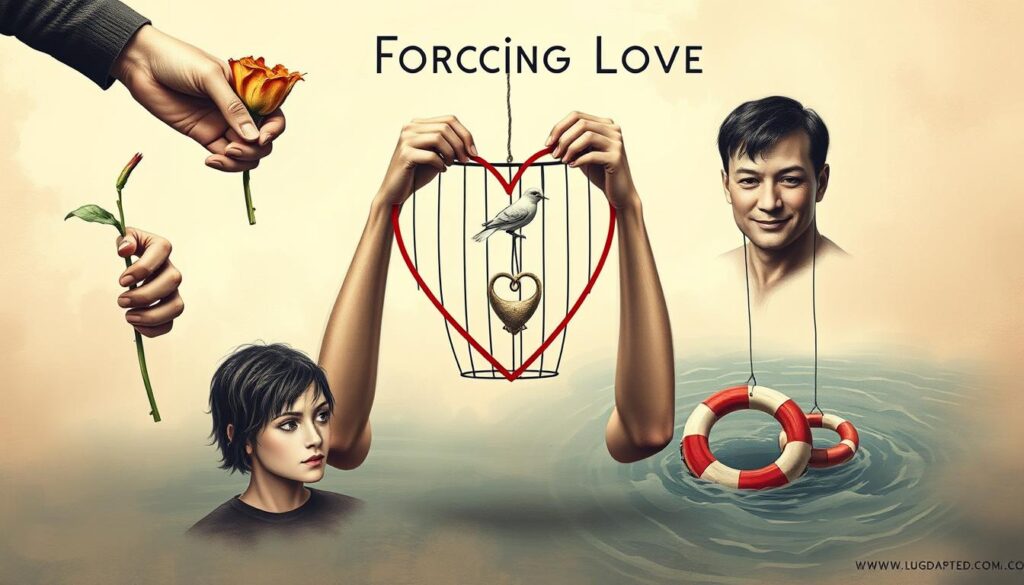Have you ever doubted your feelings in a relationship? Many of us deal with the signs of forced love, seeking something true. You might have felt a lack of genuine connection. This can lead to important realizations about your romantic tie. True love needs mutual care, respect, and freedom, not force.
Our society and our own fears can make it hard to see if love is forced. Staying where it’s comfortable is easier, especially when we fear being alone. By understanding signs of unhealthy bonds, you can look for a love that’s more meaningful. Real love should feel easy and right.
Key Takeaways
- Forced love often stems from external pressures and societal norms.
- Recognizing signs of forcing love can lead to healthier relationships.
- Feelings of loneliness can contribute to staying in unhealthy dynamics.
- Emotional disconnect is a key indicator of forced affection.
- Understanding your feelings is vital for building authentic connections.
Understanding Forcing Love
The definition of forcing love means making someone feel they have to love another. This might happen when one person feels forced to stay in a relationship without true feelings. Reasons include pressures from society, personal doubts, or others’ expectations.
About 40% of adults are scared of being alone. This fear makes them convince themselves they are in love to not feel lonely. They do this to fit societal views on romance.
Moreover, the psychological effects of forcing love are serious. Around 30% feel pressured by loved ones, affecting their true feelings. Not understanding one’s own feelings is common, leading to confusion. Also, half of those in such relationships look for approval, which causes emotional pain.
It’s crucial for both people in a relationship to be fully committed. Many report feeling tired from constant disagreements and one-sided feelings. Knowing more about this can help people spot and avoid bad relationship patterns. This leads to healthier and happier connections.
| Factor | Percentage Affected |
|---|---|
| Fear of Loneliness | 40% |
| External Pressures | 30% |
| Personal Insecurities | 50% |
| Feeling Drained | 50% |
| Confirming Love for Validation | 50% |
What Does It Mean to Force a Relationship?
Forcing a relationship means trying to keep a partnership going without real connection or love. People in such relationships often feel they must stay together out of duty, not affection. This stress can hurt one’s happiness and mental health.
Signs of forced love include:
- Incessant efforts to resolve conflicts without satisfactory outcomes.
- Repeated compromises that feel more like sacrifices to one’s own values.
- A constant feeling of emotional unfulfillment and loneliness in the partnership.
About 39% of adults put up with minimal effort from their partners. This shows many settle for less in love. The American Psychological Association found that 70% of couples fight at least once a month. This reveals the struggle in forced relationships.
About 55% of people have let go of their beliefs for their partner. This leads to ignoring one’s emotional needs. The National Institute of Mental Health says unhealthy relationships can increase anxiety and depression by 42%. This shows how harmful forced love can be.

It’s important to recognize when a relationship is forced for your well-being. Knowing why you’re hanging on helps you make better choices. This can lead you to more genuine and fulfilling romantic connections.
| Statistic | Percentage |
|---|---|
| Adults who believe they have settled for less in relationships | 39% |
| Couples experiencing significant conflicts monthly | 70% |
| Individuals feeling their emotional needs are unmet | 43% |
| Individuals in unhealthy relationships likely to face anxiety | 42% |
| Individuals who compromised values for their partner | 55% |
5 Common Reasons You Might Force Love
Forcing love usually comes from things inside us and what we see around us. These reasons help us understand why we act in love. Here are five key reasons you might feel pushed to force love.
Societal Expectations
Many feel the need to match up to what society expects in love. About 58% say they feel pushed by these norms. This makes them accept relationships that don’t really make them happy. Feeling this pressure can make you rush into love, instead of waiting for a true spark.
Fear of Loneliness
The scare of being solo can make people jump into shallow relationships. Over 60% in one-sided love feel lonely, even with their partner right there. This fear drives them to settle for any affection they get. It leads to choices in love that don’t fulfill them.
External Influences
The opinions of our family and friends matter a lot in who we choose to love. Studies say 55% of people feel they have to explain their love life to others. These opinions can make you feel stuck in a relation that’s not right, making you force love.
Personal Insecurities
Our own doubts can make us question if we deserve love. An alarming 65% overlook their instincts, ending up unhappy for long. These doubts can make you ignore big warning signs or justify bad behavior, trapping you in forced love.
Lack of Alternative Options
Not seeing other options can make you stick to what you have. Around 50% of couples are cautious because of poor communication. The dread of starting fresh can keep you in a dead-end relationship, adding to the cycle of forced love.

Signs You Are Forcing Love Someone
It is key to see if you’re pushing love in a bond. Some actions may show love isn’t real, pointing to indicators of unhealthy relationships. Here are signs of forced affection red flags.
Always the First to Settle a Fight
Being the first to fix disagreements often? It could mean your bond is not balanced. A solid relationship needs both to work on conflicts. Always taking the step to resolve issues might show forced love, not natural.
Constant Persuasion is Necessary
Needing to always keep convincing your partner? That’s a warning. Love should grow on its own. If not, it might lack a true emotional connection.
Making All the Compromises
Always bending to what your partner wants? That’s not healthy. It can lead to an unfair balance. This might mean you’re working too hard in love.
Feeling Alone Despite Being Together
Feeling lonely even when you’re not alone is a big sign. If there’s no emotional connection, you might feel isolated. Love is about feeling close, not distant.
Begging for Intimacy or Affection
Having to ask for closeness or care often? That’s troubling. Good relationships naturally become intimate. Needing to beg shows deep issues.

| Sign | Description |
|---|---|
| First to Settle Fights | Signals imbalance in conflict resolution. |
| Need for Persuasion | Indicates lack of genuine connection. |
| All Compromises by One Party | Highlights a potentially unhealthy dynamic. |
| Feeling Alone Together | Reflects emotional disconnection. |
| Begging for Intimacy | Exposes potential forced affection issues. |
Recognizing the Red Flags in Your Relationship
It’s key to spot red flags in relationships for your emotional health. Many warning signs can be tricky to see. They’re often hidden under confusion and love. For example, excessive jealousy is a huge red flag. It shows in about 50% of abusive situations. This kind of jealousy can push you away from friends and family.
Another red flag is when a partner controls who you see. Studies show that 62% of those emotionally abused face this issue. It reflects unhealthy relationship behaviors. If your partner never admits when they’re wrong, that’s a problem too. About 70% of abusers blame their partners for issues. This may make you doubt your own feelings and thoughts.

A lot of people face verbal abuse. Up to 54% of women and 30% of men have been there. These situations can get worse, leading to more violence. If you feel forced into things, especially intimate ones, it’s not okay. It shows a disregard for your boundaries, pointing to an unhealthy relationship.
Unrealistic expectations also add strain. About 47% of troubled relationships have one partner demanding too much from the other. This causes stress and unhappiness. It can be tough to tell the difference between real care and harmful control.
Be alert and care for your emotional well-being. By seeing these red flags, you can move toward healthier ties. Knowing these signs helps you create real connections and grow. Look closely at these indicators to protect your heart and mind.
Evaluating Your Feelings
It’s key to take time for introspection when looking at your relationship feelings. Your gut feelings can reveal a lot about if your emotions are real or just a reaction to pressure. This practice of reflection helps you understand your feelings better. It makes it easier to know what you really want from your relationship.
Listening to Your Gut Feelings
Trusting your instincts is crucial in spotting when things feel off. Studies show that 70% of people in relationships have felt unhappy or unsatisfied at times. Ignoring warning signs can make you more uncomfortable. Learning to trust your instincts helps you be more aware. This way, you can tackle problems before they get worse.
Comparing with Other Relationships
Looking at healthy relationships can give you important insights. About 55% of people often doubt their compatibility. Compare your relationship with those of friends or family. Talking about shared experiences helps you understand more about love, talking, and being happy together. For example, noticing big differences can show where you might improve.

| Aspect | Your Relationship | Friend’s Relationship |
|---|---|---|
| Level of Communication | Struggles with expression (80%) | Open dialogue (90%) |
| Feeling of Affection | Diminished affection (70%) | Consistent affection |
| Happiness Levels | Unhappy feelings (70%) | Contentment reported |
| Number of Shared Interests | Diminished interests (60%) | Growing shared interests |
| Emotional Connection | Indifference observed (58%) | Deep emotional bond |
Reflecting on these aspects with people you trust can help you see your situation more clearly. It’s normal to feel unsure about your relationship. But acknowledging these feelings can lead to valuable talks. These discussions can improve understanding and strengthen your connection.
The Importance of Authentic Love
Understanding authentic love is more than feeling attracted. About 90% of people mistake excitement for love. This overlooks the depth of true emotional bonds. Authentic love comes from mutual respect and feeling emotionally in tune. It lets deep connections grow. Working on it brings great rewards.

Genuine affection boosts happiness in relationships and helps us grow. Over 75% say their experiences define their view of love. This shows love changes and grows through good and bad times.
Yet, some think love should come without effort, which isn’t true. Around 70% believe the right partner makes life easier. However, facing challenges together actually makes bonds stronger. Studies find that couples who overcome hardships feel 60% happier together. This proves that hard times can build strength in a relationship.
In the end, real love creates lasting emotional ties, making life better. Choosing true love over something shallow leads to stronger, healthier relationships.
When to Seek Help or Counseling
Knowing when to get relationship counseling is key in solving love life problems. If you feel unhappy, lonely, or stressed out often, it’s a sign. Recognizing these issues helps you see when you need a professional’s help.
Many couples have trouble talking to each other. About 65% say bad communication is a big reason they need counseling. If you often misunderstand each other, feel alone, or can’t share your feelings, it’s time for help.
Don’t ignore when you feel disconnected emotionally. About half of people stop sharing their thoughts and feel this gap. Putting other things before spending time together can make you feel lonelier. This is when professional help for relationships is needed.
Noticing when you feel unloved is also important. Up to 70% of married folks feel less romance over time. If this loss hits hard, getting professional support can clear things up emotionally.

Think about if low self-esteem or anxiety affects how you connect with your partner. Some 30% of people feeling unloved deal with these issues. They can really change how your relationship works, so therapy might be a good step.
Waiting too long to get help can hurt a lot. Studies show couples wait around six years to tackle early issues. Getting relationship counseling early can boost your happiness chances by 70%. This also leads to healthier ways of interacting.
| Signs You May Need Counseling | Potential Effects |
|---|---|
| Poor Communication | Frequent misunderstandings and feelings of frustration |
| Emotional Disconnect | Feelings of loneliness while in a relationship |
| Feeling Unloved | Increased dissatisfaction and emotional stress |
| Low Self-Esteem | Difficulties in maintaining healthy relationships |
| Delayed Problem Addressing | Exacerbation of issues leading to possible separation |
Building Healthy Relationship Dynamics
Building strong relationships requires hard work and a focus on mutual respect. Good communication is key. It makes sure both people can share their needs and feelings. Also, showing love and support helps build trust.
Handling power in relationships is very important. Often, partners may fall into harmful patterns. These can cause upset and misunderstandings. It’s crucial to talk openly about needs and how we communicate love.

- Practice active listening to validate each other’s feelings.
- Discuss love languages to ensure both partners feel appreciated.
- Set personal boundaries and respect each other’s space.
- Encourage compromises during disagreements to foster collaboration.
- Seek professional help if necessary to address unresolved issues.
Using these tactics strengthens emotional connections. It helps create a deeper bond and understanding. For true happiness and closeness, both partners need to be committed to healthy dynamics.
| Power Dynamics | Impact on Relationships |
|---|---|
| Demand/Withdrawal | Dissolution of trust and increased conflict over minor issues. |
| Distancer/Pursuer | Misunderstandings related to attachment styles and love languages. |
| Fear/Shame | Exacerbated by unresolved trauma, leading to instability. |
| Emotional Intelligence | Higher satisfaction in relationships correlates with emotional awareness. |
| Boundary Setting | Essential for fostering respect and personal comfort. |
Conclusion
This summary talks about the danger of pushing for love. It points out the importance of having mutual respect and natural chemistry. Love shouldn’t be a result of feeling obligated or pressured.
Many people stay in relationships that don’t make them happy because they’re scared of being rejected. They might also feel pressured by others or have a strong need to be liked. It’s very important to understand why you feel this way.
Finding true connections begins with looking inside yourself and being emotionally strong. Think about your relationships. Are you accepting less than you deserve? Knowing your feelings are important helps you be open and strong.
Being aware lets you deal with love’s complexities. This leads to deeper and more meaningful relationships.
Last thoughts on love focus on the importance of patience and effort. By building healthy relationships and living in the moment, you allow real love to grow. Make sure you focus on being happy and healthy as you learn more about yourself and how to grow in relationships.










